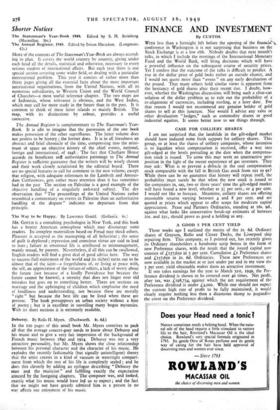FINANCE AND INVESTMENT
By CUSTOS Watt less than a fortnight left before the opening of the financi3' conference in Washington it is not surprising that business on the Stock Exchange is at a low ebb. Nobody doubts that next month's talks, in which I include the meetings of the International Monetary Fund and the World Bank, will bring decisions which will have a powerful influence on the subsequent course of security prices. Yet I confess that the outcome of the talks is difficult to predict. A rise in the dollar price of gold looks rather an outside chance, and I would not quote more than "evens " on any early devaluation of the pound. That many others hold similar views is apparent from the hesitancy of gold shares after their recent rise. I doubt, how- ever, whether the Washington discussions will bring such a clear-cut solution of the dollar problem as to rule out the probability of a re-alignment of currencies, including sterling, at a later date. For that reason I would not recommend any genuine holder of gold shares to sell at this juncture. Nor would I advise any sales or other devaluation " hedges," such as commodity shares or good industrial equities. It seems better now to see things through.
CASE FOR COLLIERY SHARES
I am not surprised that. the landslide in the gilt-edged market should have induced some fresh support for colliery shares. This group, or at least the shares of colliery companies, whose intention is to liquidate when compensation is received, offer a way into gilt-edged at the levels prevailing at the date when the compensa- tion stock is issued. To some this may seem an unattractive pro- position in the light of the recent experience of gas investors. They may ask: What is to prevent a debacle in the coal compensation stock comparable with the fall in British Gas stock from tot to 91? While there can be no guarantee that history will repeat itself, the probability must surely be that when the new stock is issued to the companies in, say, two or three years' time the gilt-edged market will have found a new level, whether at 31 per cent., or 4 per cent. I would not like to forecast. Meantime, colliery shares are offering reasonable returns varying between 4 and 8 per cent. and are quoted at prices which appear to offer scope for moderate capital appreciation. Pease and Partners Ordinaries, standing at t6s. 9d., against what looks like conservative break-up estimates of between 2os. and 25s., should prove as good a holding as any.
A GOOD 5 PER CENT YIELD Three weeks ago I outlined the merits of the 2s. 6d. Ordinary shares of Grayson, Rollo and Clover Docks, the Liverpool ship repairing firm. This company, as I pointed out, has recently given its Ordinary shareholders a handsome scrip bonus in the form of new Preference shares, with the result that the issued capital now consists of £157,650 in 5 per cent. Cumulative Li Preference shares and £157,650 in 2S. 6d. Ordinaries. These new Preferences are now available in the market at or just under par and in my view the 5 per cent. yield obtainable makes them an attractive investment.
If one takes earnings for the year to March 31st, 1949, the Pre- ference dividend is shown to be covered over 40 times. Net profit, after tax, was £198,734, against which the net requirement of the Preference dividend is under £4,000. While one should not expect the current high rate of profit to be fully maintained, it would clearly require nothing less than a disastrous slump to jeopardise the cover on the Preference dividend.






























 Previous page
Previous page